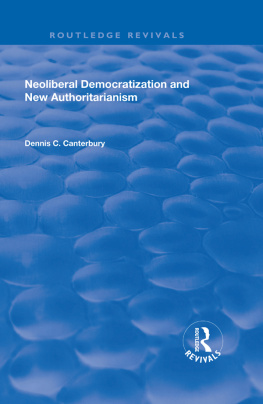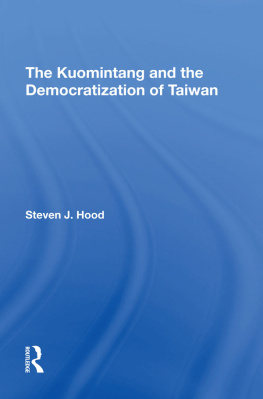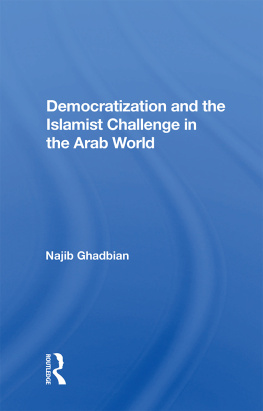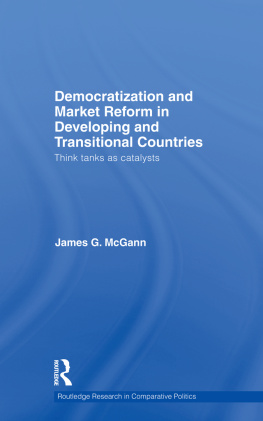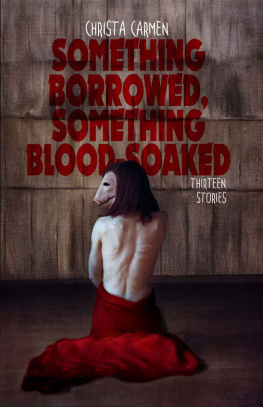Turkeys Democratization Process
Since the end of the 1980 coup dtat Turkey has been in the midst of a complex process of democratization. Applying methodological pluralism in order to provide a comprehensive analysis of this process in a Turkish context, this book brings together contributions from prominent, Turkish, English, French and Spanish scholars.
Turkeys Democratization Process utilizes the theoretical framework of J. J. Linz and A. C. Stepan in order to assess the complex process of democratization in Turkey. This framework takes into account five interacting features of Turkeys polity when making this assessment, namely: whether the underlying legal and socio-economic conditions are conducive for the development of a free and participant society; if a relatively autonomous political society exists; whether there are legal guarantees for citizens freedoms; if there exists a state bureaucracy which can be used by a democratic government; and whether the type and pace of Turkish economic development contributes to this process.
Examining the Turkish case in light of this framework, this book seeks to combine analyses that will help assess the process of democratization in Turkey to date and will be of interest to scholars and researchers interested in Turkish politics, democratization and Middle Eastern studies more broadly.
Carmen Rodrguez is Researcher of Contemporary Turkish Studies at Election Watch OPEMAM, Autnoma University of Madrid. Her research interests include democratization, political parties and Turkey-EU relations.
Antonio valos is Researcher at TEIM (Mediterranean International Studies Team), Autnoma University of Madrid. His work focuses on the political and military elite and secularism in Turkey.
Hakan Ylmaz is Professor at the Department of Political Science and International Relations, Boazii University, Istanbul. His research interests include political ideologies and political culture in post-World War II Turkey; culture and identity dimensions of EU-Turkey relations; and external-internal linkages in the process of democratization.
Ana I. Planet is Professor at the Arab and Islamic Studies Department and Director of TEIM (Mediterranean International Studies Team) at Autnoma University of Madrid. Her research interests include Moroccan migration to Spain and political debates regarding Islam in Europe.
Routledge Studies in Middle Eastern Politics
1. Algeria in Transition
Ahmed Aghrout with Redha M. Bougherira
2. Palestinian Refugee Repatriation
Edited by Michael Dumper
3. The International Politics of the Persian Gulf
Arshin Adib-Moghaddam
4. Israeli Politics and the First Palestinian Intifada
Eitan Y. Alimi
5. Democratization in Morocco
Lise Storm
6. Secular and Islamic Politics in Turkey
mit Cizre
7. The United States and Iran
Sasan Fayazmanesh
8. Civil Society in Algeria
Andrea Liverani
9. Jordanian-Israeli Relations
Mutayyam al Oran
10. Kemalism in Turkish Politics
Sinan Ciddi
11. Islamism, Democracy and Liberalism in Turkey
William Hale and Ergun zbudun
12. Politics and Violence in Israel/Palestine
Lev Luis Grinberg
13. Intra-Jewish Conflict in Israel
Sami Shalom Chetrit
14. Holy Places in the Israeli-Palestinian Conflict
Edited by Marshall J. Breger, Yitzhak Reiter and Leonard Hammer
15. Plurality and Citizenship in Israel
Edited by Dan Avnon and Yotam Benziman
16. Ethnic Politics in Israel
Asad Ghanem
17. Islamists and Secularists in Egypt
Dina Shehata
18. Political Succession in the Arab World
Anthony Billingsley
19. Turkeys Entente with Israel and Azerbaijan
Alexander Murinson
20. Europe and Tunisia
Brieg Powel and Larbi Sadiki
21. Turkish Politics and the Rise of the AKP
Arda Can Kumbaracibasi
22. Civil Society and Democratization in the Arab World
Francesco Cavatorta and Vincent Durac
23. Politics in Morocco
Anouar Boukhars
24. The Second Palestinian Intifada
Julie M. Norman
25. Democracy in Turkey
Ali Resul Usul
26. Nationalism and Politics in Turkey
Edited by Marlies Casier and Joost Jongerden
27. Democracy in the Arab World
Edited by Samir Makdisi and Ibrahim Elbadawi
28. Public Management in Israel
Itzhak Galnoor
29. Israeli Nationalism
Uri Ram
30. NATO and the Middle East
Mohammed Moustafa Orfy
31. The Kurds and US Foreign Policy
Marianna Charountaki
32. The Iran-Iraq War
Jerome Donovan
33. Surveillance and Control in Israel/Palestine
Edited by Elia Zureik, David Lyon and Yasmeen Abu-Laban
34. Conflict and Peacemaking in Israel-Palestine
Sapir Handelman
35. Arab Minority Nationalism in Israel
Amal Jamal
36. The Contradictions of Israeli Citizenship
Edited by Guy Ben-Porat and Bryan S. Turner
37. The Arab State and Womens Rights
Elham Manea
38. Saudi Maritime Policy
Hatim Al-Bisher, Selina Stead and Tim Gray
39. The Arab State
Adham Saouli
40. Regime Stability in Saudi Arabia
Stig Stenslie
41. Sacred Space in Israel and Palestine
Edited by Marshall J. Breger, Yitzhak Reiter and Leonard Hammer
42. The UN and the Arab-Israeli Conflict
Danilo Di Mauro
43. Sectarian Conflict in Egypt
Elizabeth Iskander
44. Contemporary Morocco
Edited by Bruce Maddy-Weitzman and Daniel Zisenwine
45. Political Regimes in the Arab World
Edited by Ferran Brichs
46. Arms Control and Iranian Foreign Policy
Bobi Pirseyedi
47. Everyday Arab Identity
Christopher Phillips
48. Human Rights in Libya
Giacomina De Bona
49. Negotiating Political Power in Turkey
Edited by Elise Massicard and Nicole Watts
50. Environmental Politics in Egypt
Jeannie L. Sowers
51. EU-Turkey Relations in the Twenty-first Century
Birol Yesilada
52. Patronage Politics in Egypt
Mohamed Fahmy Menza
53. The Making of Lebanese Foreign Policy
Henrietta Wilkins
54. The Golan Heights
Yigal Kipnis
55. Iranian Foreign Policy since 2001
Edited by Thomas Juneau and Sam Razavi
56. Modern Middle East Authoritarianism
Edited by Noureddine Jebnoun, Mehrdad Kia and Mimi Kirk
57. Mobilizing Religion in Middle East Politics
Yusuf Sarfati
58. Turkeys Democratization Process
Edited by Carmen Rodrguez, Antonio Avaloz, Hakan Yilmaz and Ana I. Planet







